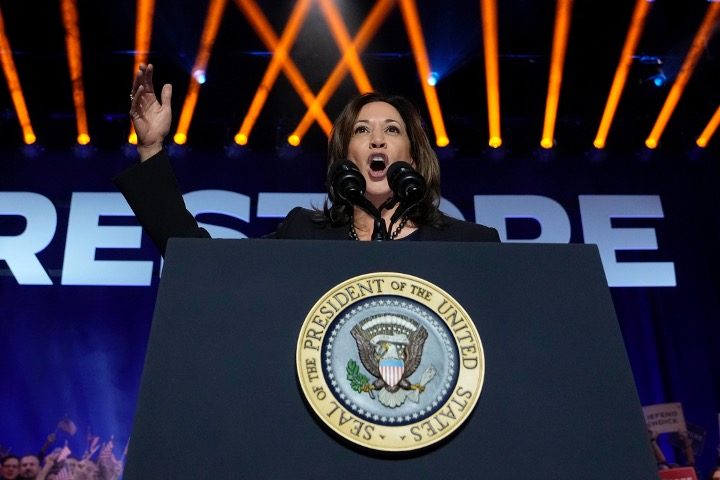
“People often ask, ‘Where are all the leaders?’ But it’s the wrong question. They should instead ask, ‘Where are all the followers?’”
This statement, which I made on a radio show many years ago, mirrors the old aphorism, “People get the government they deserve.” It also is essentially what’s lamented by an author who asks about Kamala Harris’s supporters: “Are these people crazy?”
Identity Politics
Writing at American Thinker, Sha’i ben-Tekoa goes on to state that our Republic is in grave danger when massive numbers of Americans think Harris, best known for word salads and odd cackles, is qualified to be president and control the nuclear football. Ben-Tekoa isn’t exaggerating about her support, either. The RealClearPolitics polling average puts President Trump only 1.7 points ahead of Harris, with a couple of individual surveys actually showing her with a two-point lead.
Emphasizing that she has no experience in matters of war, geopolitics, or business, ben-Tekoa writes that Harris’s supporters apparently believe “all one needs [to be president] is the right skin color and reproductive organs.” He adds that she is in addition “vacuous, inarticulate, and dishonest.”
In truth, even liberals have a history of disliking Harris. The identity-politics poobahs had high hopes for her, a non-white female of biracial background, when she announced her presidential run in 2019. But all the boxes she checked couldn’t save her campaign: Lacking “money, a message and a cohesive campaign operation,” as NBC News put it last week, Harris’s effort quickly collapsed and she dropped out before a single Democratic-primary vote was cast. Strikingly, she was poised to lose even her home state, California.
(Realize, too, that some left-wing organizations/individuals such as Black Lives Matter and Cenk Uygur have denounced the “anointing” of Harris as the Democrats’ presumptive presidential nominee.)
How Did Kamala Get Here?
It’s instructive noting that we might’ve never even heard of Kamala Harris had it not been for a man named Willie Brown. Harris began a sexual relationship with Brown in 1994 when she was 29 or 30 and he 60. While it’s clear what she was selling, many say that also obvious was the payment. Brown, then-speaker of the California Assembly and a Golden State mover and shaker, helped jump-start Harris’s political career by giving her a couple of patronage positions and, by his own admission, helped her win her district attorney’s office.
This said, critics’ claim that she “slept her way to the top” is over the top.
At most, she slept her way to the middle.
Cultural affirmative action took her the rest of the way.
Harris’s sex and racial identity were, after all, why she was chosen to be Biden’s 2020 running-mate.
They’re also a major reason she’d be hard to replace at the Democratic ticket’s pinnacle: Doing so would risk alienating black women, a major left-wing voting bloc.
So here we are — and ben-Tekoa minces no words about where it is. America is in the grip of “a psychological madness,” he writes in his concluding paragraph, that “has turned Thomas Jefferson’s political grandchildren into a community bereft of common sense and the ability to see that Kamala Harris has no qualifications and earned no merit to be president.” Really, though, ben-Tekoa is just lamenting man’s nature.
Is “Experience” the Critical Factor?
Harris’s supporters aren’t “crazy” (not all of them, anyway), but something else: human. Very human error in judgment is reflected in ben-Tekoa’s article, too. That is, is Harris’s lack of “experience” in war, geopolitics, and business really the issue?
Ronald Reagan had only ever been an actor when he won California’s governorship in 1967, but he proceeded to become a legendary modern president. Trump was a real-estate magnate and reality TV star who it also could be said didn’t have experience in geopolitics or war, yet he negotiated geopolitics effectively enough to become the first commander in chief in 40 years to not get us involved in any new war.
In contrast, Biden has had more than 50 years of political “experience.” Lyndon Johnson was another such failed president, having been a congressman and then senator for decades.
Whatever you think of the above men, obvious should be that it isn’t experience that’s the critical factor here, but wisdom (along with other virtues). In fact, because wisdom is a prerequisite for deriving great value from your experiences is why some people have more “experience” after one year than others do after 10.
Consider, too, that while most people have expertise in only a very narrow range of endeavor, a president must tend to a multitude of areas from war to economics to soup to nuts. He ideally should be a Renaissance man — i.e., a jack of all trades and master of some.
Does Kamala Harris fit the bill of being a wise Renaissance lady?
Will Voters Vote for Her?
Speaking of sagacity’s lack brings us to her supporters. In reality, whether it was the ancient Roman observing that the average person cared about “the pebble in his shoe” or Winston Churchill noting that the “best argument against democracy is a five-minute conversation with the average voter,” lamenting the “people’s” judgment is nothing new.
In our time, a certain percentage (30, 35?) of the electorate will reflexively vote Democrat or Republican no matter what. With many it’s mere partisan prejudice, “Four legs good, two legs bad.” Others are influenced to vote for an identity-politics candidate to help “make history” and/or buttress their own self-image. These people are largely immune to logic and fact, as “You cannot reason a man out of a position he has not reasoned himself into,” to paraphrase British satirist Jonathan Swift. They, and this has always plagued man, are operating not rationally but emotionally. And as their emotions go, so does their support. Collective emotional foundation can change, too.
To echo ancient Greek philosopher Plato, just as children can be raised in an atmosphere of nobility and grace and develop an emotional attachment to virtue, so can raising them in a corruptive culture inculcate an emotional attachment to vice. As the latter phenomenon intensifies nationally, virtue dies in the people. And as virtue declines, demagogues rise.
For this reason, elections tell us not just who our leaders will be, but what we, as a people, have become.




